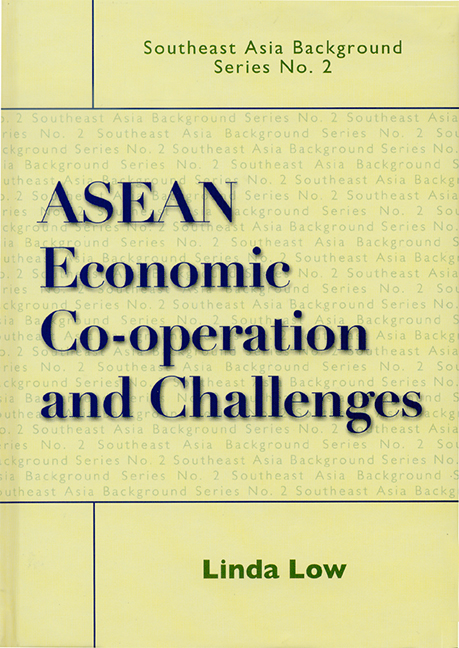2 - Trade Co-operation
Published online by Cambridge University Press: 21 October 2015
Summary
INTRODUCTION
There has been a perceived change from political and security concerns since the inception of ASEAN in 1967 to an economic emphasis since 1976. Increasing intra-ASEAN trade has been the primary goal of ASEAN since the economic gear has been in place.
Traditionally, intra-regional trade is promoted when members in a trade arrangement or trade bloc drop tariffs and other trade barriers for each other in what is deemed trade creation. This may be at the expense of some trade diversion for non-ASEAN trade partners as substitution takes place with cheaper ASEAN products without tariffs. But on a net basis, trade creation usually exceeds trade diversion to make net trade effects generally favourable for all concerned. In fact, the World Trade Organisation is a kind of “watch-dog” to ensure any bilateral or regional trade arrangements among its members first receive approval to have their trade arrangements outside of the World Trade Organisation's most favoured-nation principle based on the net positive effect for all.
WHY THE ECONOMIC EMPHASIS
By the ASEAN Summit in Bali in 1976, ASEAN states had all suffered from the first oil-induced recession of 1974–75, after the Organisation for Petroleum Exporting Countries (OPEC) quadrupled oil prices during a Middle East war. It caused a stagflation, implying economic stagnation with high unemployment and inflation which further reduce supply and production as demand is dampened, all in a vicious circle. While the oil-producing economies including Brunei, Indonesia and Malaysia, even Singapore as the world's third largest oil refiner after Houston and Rotterdam, benefited from higher oil prices, the general impact had been recessionary.
A switch in gear to ASEAN economic co-operation was also timely, as security and political concerns had receded somewhat by 1976. China had begun to open diplomatic ties first with the United States, a precursor to its formal economic opening in 1978, putting a hiatus to the “domino theory” of communism. Instead, the region as a whole seems to be gearing up in economic terms, if prosperity and development have to be generated by economics in the first instance.
- Type
- Chapter
- Information
- ASEAN Economic Co-operation and Challenges , pp. 13 - 30Publisher: ISEAS–Yusof Ishak InstitutePrint publication year: 2004



